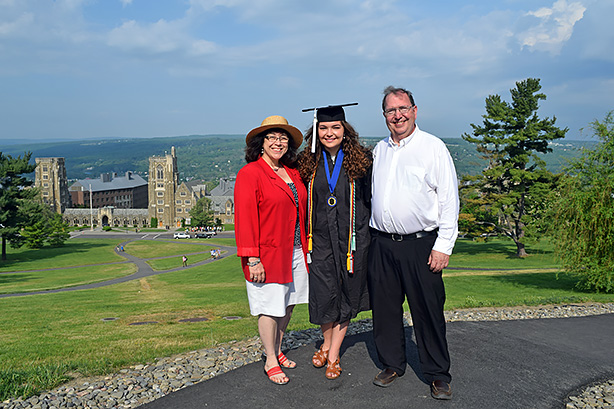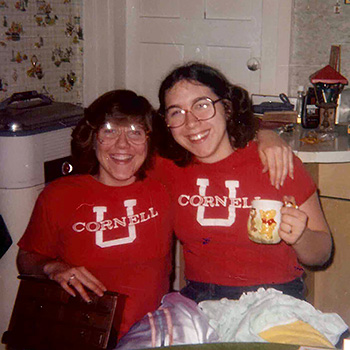
From left, Sheila '81, Leah '16 and Joe DeWitt during Cornell's Commencement Weekend in May 2016. Photo: provided.
Alumna's company improves drug safety, efficacy through 'chiral switching'
A company created by Sheila DeWitt '81 has perfected a process that could bring new drugs to market to treat fatty liver disease and other ailments. The process also could bring back safer versions of older drugs like thalidomide, which is currently marketed as an anti-cancer agent.

Sheila and her sister, Sandy (Hobbs) Kress, celebrate Sheila's birthday in May 1979. Photo: provided.
DeWitt, an undergrad chemistry major at Cornell who earned her Ph.D. at Duke, is CEO of DeuteRx, a company spun out in 2012 after DeWitt's successful sale of another company she founded, Deuteria Pharmaceuticals.
DeWitt explains her company's focus -- chirality in drugs -- by using the analogy of right- and left-handedness. Chiral molecules are chemically identical but asymmetrical, non-superimposable mirror images of each other; some are distinctly "left-handed" and some are "right-handed." The same chemical compound can behave very differently depending on this chirality.
Scientists didn't know how to separate the right- and left-handed versions of these compounds until the late 1980s, DeWitt says. The separation and development of a preferred chiral compound from a two-compound mixture is known as a chiral switch.
This switching, or selection for just one mirror image of a chiral drug, can offer patients improved therapeutic benefits, consistent behavior in the body and fewer side effects; however, some mixtures are easier to separate than others because the left- and right-handed compounds chemically interconvert.
Enter DeWitt's novel approach of deuterium-enablied chiral switching, which the company has used to stabilize and separate compounds associated with more than 13 marketed drugs. Plans are for one of those drug candidates to begin human clinical trials in the fall, DeWitt says.
"It's estimated that 30 percent of type II diabetes patients have NASH [nonalcoholic steatohepatitis, a severe form of fatty liver disease]," DeWitt says. "NASH can progress to cirrhosis and liver cancer, but there are no drugs approved right now."
The only drug recommended off-label for the treatment of NASH, DeWitt says, is the drug Actos, but it causes side effects such as weight gain, a dangerous issue for someone with diabetes. The stabilized right-handed compound, which DeWitt's company is developing, eliminates some of these side effects in animal models and they are hopeful it will do the same in humans. This same drug candidate may also treat adrenoleukodystrophy (ALD), also known as Lorenzo's disease.
DeWitt's career is a bit of a surprise for her, she says; as a student, she was a first-generation high school and college graduate; arriving at Cornell, she did not realize it was in the Ivy League.
"I went into chemistry instead of engineering because I thought engineers drove trains," she says. "And I almost had to transfer out of Cornell because of financial reasons."
As a member of the Cornell Alumni Admissions Ambassador Network (CAAAN), she now tells students not to let their financial situation affect their decisions about college.
"You should go to the best school possible because it will help you later in life in ways you will never realize when you're young," she says.
She credits a high school chemistry teacher for inspiring her in a subject that she loved for its challenges. She graduated as valedictorian of her high school class in Middleport, New York, and chose Cornell over Columbia because she didn't want to live in a big city.
DeWitt secured a lab job at a company back home after her freshman year. Later, a couple of Cornell professors mentored her as she continued to develop her lab skills through independent research projects.
After Cornell, she landed a job as a scientist for eight months before going on to earn her Ph.D. in organic chemistry from Duke University.
After several years of working in labs for firms like Parke-Davis Pharmaceutical Research and being involved in cutting-edge chemistry technologies, she found herself interested in the business development side of things and transitioned to various roles in several biotechnology companies, including turning around business units and leading mergers and acquisitions.
A chemist friend asked her to help him develop a business model for his company, eventually asking her to run the company.
Throughout her career, DeWitt has maintained a relationship with Cornell's chemistry department, but that bond became even stronger when her daughter, Leah DeWitt '16, came to Cornell and decided to major in chemistry, along with a minor in religious studies.
"The last few years have been a reunion of sorts for me with Cornell," Sheila DeWitt says. "I'm realizing what it's meant to me. My experience at Cornell shook my world, but it's opened doors I never would have expected."